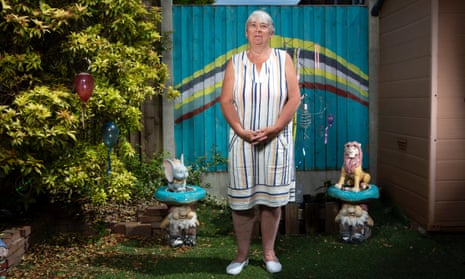For a long time I have had problems with my sight: macular degeneration meant that I had no central vision in one eye. Then, one morning in 2013, my other eye – the good one – haemorrhaged. I was told it was permanently damaged and nothing would make it better. I became officially registered as severely sight impaired or blind.
It was a big shock. Little things became so much harder, such as making a cup of tea, as I would get boiling water everywhere. People I know would stop to have a conversation in the street and I wouldn’t know who they were.
I was able to get by, but my biggest fear was that, because I was blind, the local council would stop me being a foster carer. I began fostering children 30 years ago when I was newly divorced and a single mother of three, after spotting an advertisement in the Oldham Chronicle. At the time, I was looking after friends’ children when they were at work, but I liked the idea of helping children who really needed it. I didn’t think the council would want me because I was single, but they didn’t seem to mind.
It was an arduous application process, but less than an hour after being approved to foster, I had a phone call asking if I would take a five-week-old baby boy. He stayed with us until just before his first birthday, and since then I’ve fostered more than 150 children.
Councils and foster agencies rarely let people with disabilities become foster parents. When I got back home from the eye hospital, I thought they would say I could no longer do it and would take away the children I was looking after. The only foster carer I know who has a disability has MS, but they have a partner to help. I thought they wouldn’t want someone who was both disabled and single, and I was absolutely heartbroken at the thought. I couldn’t stop thinking about what would happen to the children. But someone from the council came to see me and, after asking a lot of questions and carrying out new risk assessments, they said they wanted me to continue.
I’ve lost count of how many children I have fostered since then. Right now, I have a three-week-old baby and a 15-year-old girl. The teenager tries to show me things on her phone, which I can’t see at all, and I have to remind her not to leave things like shoes in the middle of the floor, because when I look down I can’t see anything. Luckily, I haven’t had a bad fall at home yet, but I have tripped when out of the house. I fell over badly in the street a few weeks ago because I didn’t see the kerb. It’s easier with the baby, as long as the clothes don’t have fiddly buttons. I get my twin daughters to come to look at things like rashes to see if I need to go to the doctor.
For safety reasons, I’ve stopped taking children between two and five because they are more likely to run off in the park, and I can’t do things like cutting babies’ fingernails. Fortunately, both of my daughters are now foster carers as well, and all my children live within a 10-minute walk, so I have a lot of support. My adopted son, who is 24 and has Asperger’s, still lives with me.
The biggest problem is that I can no longer drive, so if the children have contact days with their families, they have to live close by so I can easily get there. Even without foster caring, that was the most difficult thing for me because it meant losing my independence. I know my eyes won’t get better, but I also know I will get better at dealing with it.
The hardest part of fostering hasn’t changed since I lost my sight: it’s still saying goodbye. I don’t think you can be a good foster carer if you don’t get attached. It breaks your heart when they go, but I always think, if I had kept that first one, where would all the other 150 children have gone?
I’m 63 now and don’t know when I’ll stop doing this. I don’t think there is any better job in the world. I love to see a childless couple come into my house and meet their child for the first time. Or when a parent turns things around and gets their child back. When all of a sudden a parent sees the light, it’s an unbelievable feeling for the child, but also for me.
As told to Nicola Slawson
Do you have an experience to share? Email experience@theguardian.com

Comments (…)
Sign in or create your Guardian account to join the discussion